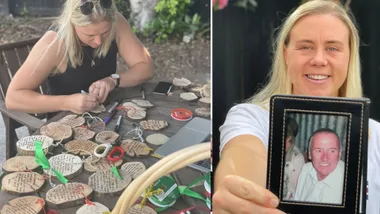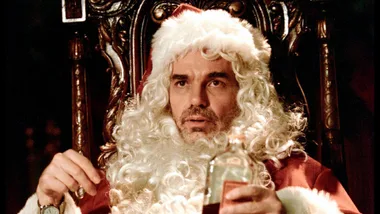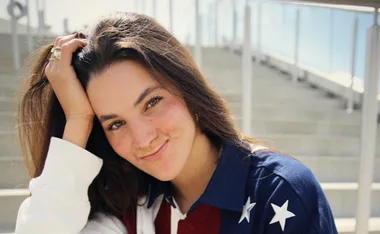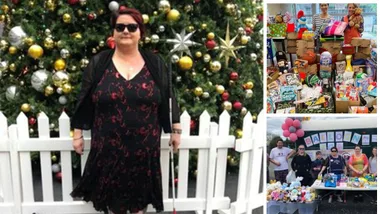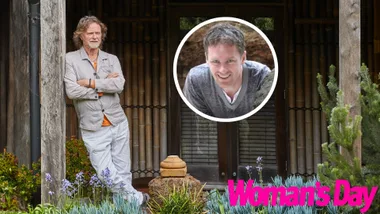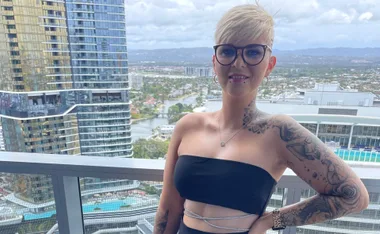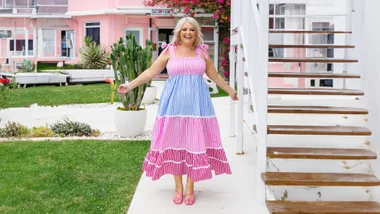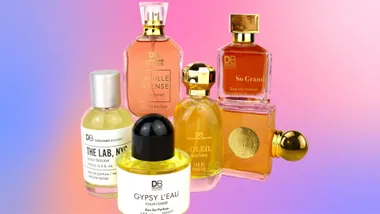NEWS UPDATE: Andy Guy, who shared his emotional, confronting and at times funny journey of transitioning from a woman to a man with The Weekly’s Clair Weaver, will join the panel of Channel 10’s The Project on Monday night at 6.30pm. Read his full story below or watch an excerpt from his documentary here.
As a cherubic-faced preschooler, Anna Guy turned to her mother one day and asked out of the blue: “Mum, is there something you can do if you want to become a boy?”
Her mother, used to the constant flow of seemingly random questions from her five-year-old, answered as honestly as she could. “Yeah, you can have an operation.”
“Oh really?” responded Anna, relieved her problem could be solved. “Can I do that then?” she asked hopefully.
“No,” came the blunt reply. While disappointed, Anna was still at an age where she believed her mum knew everything.
“Ok,” she agreed pensively. She never raised the subject with her again.
A quarter of a century later, Anna looks very different. The soulful brown eyes are still there. So is the delicate mouth. The open face and quick intelligence remain. But her once sylphlike frame has bulked out with broad shoulders and lean, muscular limbs. More than a decade of committed waxing has given way to the spread of thin wiry brown hair on her legs, arms and face. Her light soprano voice has turned husky and deep. Gone are the long, golden blonde tresses that framed an immaculately made-up face: carefully-plucked eyebrows, even-toned skin and glossy pink lips. Several staged trips to the hairdresser have culminated in a light brown short-back-and-sides cut that emphasises an open, freckled visage with a jaw that seems squarer, emphasised by a sparse goatee. An Adam’s apple has appeared.
Anna, in other words, is no more. These days, she is known as Andy. And if you passed him on the street, chances are you would perceive him as a young man. When he arrives for our interview, the security guard at front desk doesn’t hesitate to accept him as male, giving a cheerful “there you go, mate” as he signs him in and hands over a visitor’s pass. There’s no double-take or sideways stare. Indeed, Andy has found his transition less disruptive that he expected when he received his first testosterone injection seven months ago. “I thought I would have to go into hibernation and live off my savings for six months,” he says. “But life can go on quite normally. It actually feels like I’m a regular person: gym, exercise, career development, making money and trying to maintain friendships and relationships – that’s probably the toughest bit.”
Not that it has been easy. Andy is estranged from his father, who remains deeply upset by his decision to change gender. “He was probably hoping for a daughter who [would] have a career, family and get married – and that has never really been what I want,” says Andy. His younger brother, while sympathetic, isn’t close as he lives with their father. Their mother died from cancer ten years ago. No surviving relatives live nearby. Some friends have distanced themselves too, feeling betrayed and deceived. Wondering who the real Anna/Andy is and whether they ever knew this person at all. And even in 2011, at a time when most Australians support gay marriage, prejudice towards transgenderism is common.
So what made Anna do it? For as long as she could remember, she simply felt trapped in the wrong body. As a young girl, she wasn’t remotely interested in feminine pursuits. “You go to school and everyone is wearing dresses and playing with Barbies,” recalls Andy. “And I hated all that stuff. I had one friend and we were tomboys together. We had a great time doing karate and skateboarding and I think that was what probably kept me sane.” But it was more than just a tomboy phase. “I had a real longing,” he explains. “It was deeper than just wanting to dress up in [male] clothes and pretend.” But after failing to resolve her early yearnings with her mother on that pivotal day back in the early 1980’s, she made a concerted effort to fit in.
If environment alone were sufficient to change sexual identity, Anna lived in ideal conditions. For 12 years, she attended an all girls’ school, Wenona in North Sydney. She wore a dress to school every day, worked hard and attended school formals with boys. “I was really quiet as a kid,” says Andy. “I knew how I really felt but there was none of that being reflected back. Nobody else was thinking or feeling that way. So I ignored it… I never spoke of it.” At home, times were tough. Her mum was diagnosed with cancer when she was 10 and as her health deteriorated, Anna shouldered an increasing share of responsibilities. With a father struggling to cope and a younger sibling to care for, she provided the stability that helped hold the family together. When Anna was 20, her mother died.
Today, Andy is undergoing a second puberty at 31. His previous one involved the appearance of breasts, the onset of menstruation and widening of the hips. Part of his current experience is a reversal of all that: the shrinkage of breast tissue, cessation of periods and a shifting of body fat away from the hips. But there’s more: his body is morphing into a masculine shape and a new aggression has appeared. “I get a lot more angry – I used to be like ‘yeah, that’s fine’,” he says, mimicking a meek shrug, “Now I feel like my buttons are pushed a lot easier.” To cope, he works out or uses an alternative healing process called Journey Therapy to identify and release painful emotions. As a woman, Anna often felt cold and struggled to put on weight. But today, Andy is comfortable in a short-sleeved shirt while I am freezing by the end of our interview in an air-conditioned meeting room. And thanks to an increased appetite – especially for burgers and vegetables – and capacity for exercise, he is putting on weight. “It’s almost like my body is a child and it’s telling me what needs to happen,” he explains. “All of these clothes I bought a few months ago are actually quite tight on me now.” Despite a breakout of pimples that makes him feel 17 again, a common effect of enlarged male oil glands, he welcomes these changes.
To qualify for an official gender change with Medicare, Andy has been told he needs to undergo a realignment surgery. First up is usually a bilateral mastectomy to remove breast tissue. One issue is that he may not need it given the dramatic reduction from testosterone alone. Another concern is that, as an actor, Andy relies on his physical appearance for work so is unwilling to be left with obvious scarring. The next step can be a hysterectomy. And finally comes the option of phalloplasty, the creation of a penis and testicles using skin grafted from elsewhere on the body, often the inner forearm and thigh, and moulded into shape. A malleable rod or pump device is implanted to allow an erection and the female urethra extended for urination. “Initially, this was really important,” says Andy. “Now because of how I’ve been received and how I’m feeling, maybe not so much. It probably depends on what partner I attract next as well. I might meet somebody who is of a gay or bi nature and therefore stay as this and not do the surgery – but if that relationship ends, then maybe I would. I’m feeling my way through unchartered territory. There’s also acting and [the question of] whether I will do any nude roles.” Witnessing his mother undergo numerous medical procedures has also left Andy with a reflexive adversion to invasive surgery. Nevertheless, he predicts he will “go the whole way” in the next few years.
Andy won his first lead male role earlier this year in Expiry Date, a comedy that featured in Sydney’s Short+Sweet theatre festival. Interestingly, the most enthusiastic audience members were from the demographic that so far seems to be the most disapproving of transgenderism. “It’s kind of funny: the older women were in hysterics,” remembers Andy. “They were probably the group of people that loved this character the most – when they had no idea [that I was a transgender man] and it’s been those people in real life that have been like: ‘Oh god, what are you doing?” Fortunately, his transition doesn’t appear to have adversely affected his career.
He has just signed with a new agent and is working on building his profile. Given he feels much of his life has been spent playing the role of a woman, acting comes naturally to Andy.

Andy’s transformation.
While deeply traumatic, the death of her mother liberated Anna. “It was probably her dying that gave me the freedom to go out there a little bit and explore this,” says Andy, who resisted opening up to his mother for fear of upsetting or burdening her. “She might have been fine with it but I couldn’t go there.” At 22, Anna came out as gay. Thriving in a predominately male corporate environment in her previous job at Tourism Australia, she surprised some of her friends who exclaimed “you were always so guy obsessed”. Up until then, Anna had dated and slept with men, which is something she has had to reconcile with herself. “I enjoyed their bodies, maybe looking and having a body close to me – more because I wanted that [for myself],” explains Andy, who has discussed this anomaly with his psychiatrist. “He said maybe your dating guys was a longing for mates because you’d never had that and I thought ‘that’s on the money’. [Guys] liked dating me because I was like ‘let’s go watch the football’. For me, it was like I was hanging out with friends.”
Although Anna happily dated women and had two or three significant relationships, she had a niggling feeling that being a lesbian still wasn’t the whole story. “It was through talking that I realised there is a difference between being gay and transgender,” explains Andy. “[My gay friends] really loved expressing themselves with their body and being feminine, whereas I was like: ‘I could so take or leave that. They loved their breasts and I was like: ‘Oh my God, a flat chest is so much freer’.”
Anna did love women; she just didn’t identify as one. Andy believes he is most likely inherently a straight man. He has also received unsolicited attention from gay men, which he describes in his blog as “flattering”.
There is much Andy won’t miss about being a woman, including periods (he was astonished to discover it’s cheaper to take testosterone than pay for the Pill, tampons and Panadol every month), wearing women’s clothing and after-work drinks with the girls. “I used to find that really tedious because they’d just want to talk about shoes, make-up and shopping and I just couldn’t relate to that,” he says. “I was like: ‘I do my shopping twice a year and I buy everything I need.”
Five years ago, Anna decided to leave Tourism Australia to focus on her acting. She also became an accredited Journey Therapist, which gave her a strong self-awareness. “I’m a self-help junkie,” says Andy. His clear-headed insight became apparent last year when he had to see a psychiatrist to get approval to start testosterone therapy. “I thought it would take at least six months but it was literally two sessions… it was refreshing to know there wasn’t anything wrong with me.”
It was a weekend acting workshop in the US, where Andy spends half his time in training, that provided the epiphany for a sex change 18 months ago. “I was looking around the room at all the actors thinking about what roles we’d want to get in the future and I thought ‘for me, it’s not female’. There is no part of me sitting here today that feels remotely near female or wanting to go for roles that all you other people around the table are getting inspired to go for as lead female roles and actresses. If this is going to happen, it’s going to be as a man.”
Watching their mother and wife die has left very different legacies for Andy and his father. For Andy, it was “a slap in the face” that highlighted the fact that you only get one chance at life. “I’ve lived as a woman for 30 years and I want to live the next 30 years as a guy and that might sound a bit crazy to some people but… I like to explore in life .” To his father, however, life became more about “valuing what you have, keeping that going and maintaining that security.”
“[When I] told him about it, he was quite shocked,” says Andy. “I think he was upset [and thought] that I was making a decision without really thinking about what it was going to mean for him.” After backing off for a bit, Andy called him and said: “I believe you are a person who has a lot of prejudices around this stuff and that’s ok but just know that’s who your daughter/child/son is.” They don’t see each other anymore and use email to communicate about unrelated matters only when absolutely necessary. “I don’t want to force him to come to terms with things that he doesn’t really want to,” says Andy.
Nevertheless, from day one, Andy decided to be open about his experience. He pours his soul into his blog, The Andy Transformation Project, revealing every doubt, fear, breakthrough, change and milestone he encounters. By doing this, he wants to “set a new precedent as to how this is done and show you don’t have to succumb to the system”. And, like many artists, he may use his personal story as inspiration for work. Among potential projects on transgenderism in the pipeline are writing a theatrical piece, public speaking and producing a documentary story with a couple of friends.
As his journey continues, Andy understands other people’s uncertainty. He wonders how his ex-classmates will react at their next high school reunion next year. So far, his artistic and younger friends have been supportive. Unfortunately, some of his oldest mates, lesbian friends and former colleagues have become remote or unreachable.
“They see me as becoming someone else,” he says. “They’re going ‘look, she’s changing, a she to a he’ and I’ve had a few people say ‘you’re more extroverted’. People see that as me changing but actually this is just more of who I am. The difference is I’m not holding part of myself back anymore.
“I’m becoming me.”
This story was originally published by Bauer Media in 2011. Since then, Andy has undergone seven gender reassignment surgeries, including a hysterectomy, mastectomy and phalloplasty. Today, Andy tells The Weekly he is “enjoying being content in my body and get daily joys out of being called “mate” at the convenience store, being called Mr Guy when I get onto an aeroplane for example, standing at urinals, having to get my hair cut a lot more often and things like that. It’s a very liberating place to be.” He also supports families of children and young people who show signs of being transgender.



